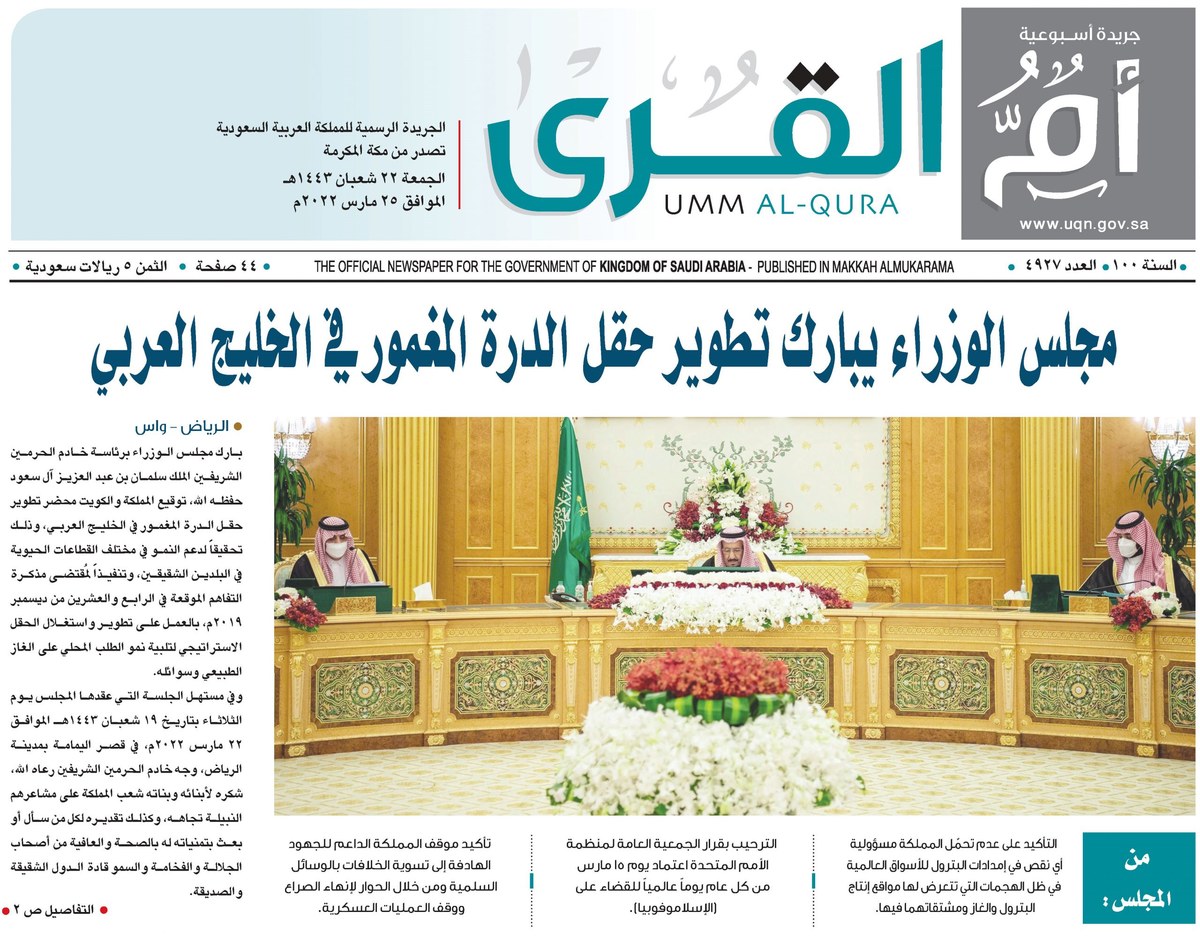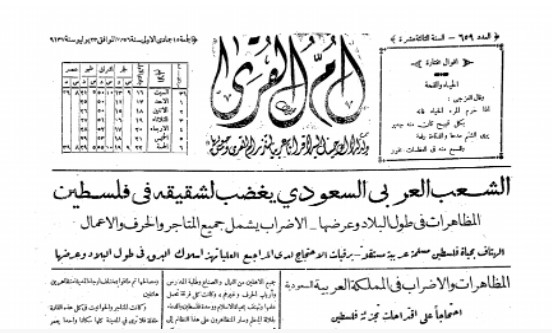MAKKAH: A week after King Abdul Aziz entered Makkah in H 1343 (1924 AD), Umm Al-Qura newspaper was published, marking the beginning of the media journey in Saudi Arabia, a country which is now a member of the G-20.
Under the patronage of King Salman, the 100th anniversary of the Saudi official gazette was celebrated at its birthplace on Wednesday at the Makkah Chamber for Exhibitions and Events Center.
The event was held in the presence of Prince Khalid Al-Faisal, who is governor of Makkah Province, and Dr. Majid Al-Qasabi, the acting minister of media.

Last issue of Umm Al-Qura (supplied)
With issue 4,928, the weekly newspaper turns a new page, but with a more developed form to reflect the renaissance era and the digital transformation the whole country is witnessing.
But historian and author Mohammed Al-Qasha’ami told Arab News that the paper was not always popular, especially during the time of its first editor-in-chief, Yusuf Yasin.
“In H 1443 (2022 AD), the paper was administratively and editorially linked to the chief administrative office of Prince Faisal bin Abdul Aziz, who was the viceroy (later third king of modern Saudi Arabia),” he said.
Umm Al-Qura was the first media outlet through which Saudis were able to learn about themselves and the world, Al-Qasha’ami said.
“It its beginnings, it was the only source of news in Saudi Arabia. There were no TV services, radios, or any other media channels,” he said.
The newspaper made notable progress during the era of its third chief editor, Mohammed Saeed Khoja, according to Al-Qasha’ami.
“Before Khoja, the newspaper was only for official statements, news about wars and general newscast,” he said. “Khoja was the first to introduce local news about education, water … everything was in the paper, even the need for pre-marriage medical inspections so that people who get married would not transfer genetic diseases.”
Despite the progress he achieved, Khoja died in his early 30s.

Al-Qasha’ami added that during World War II, all newspapers, including Sout Al-Hijaz, Al-Madina and Al-Manhal, halted production, but Umm Al-Qura did so only for a few days.
“When King Abdul Aziz found out the paper could stop due to the circumstances, he insisted it keep going,” he said.
Speaking to Arab News, Abdullah Al-Ahmadi, general manager of Umm Al-Qura, said that the leadership’s patronage of the centenary celebration was a source of pride for everyone who worked there.
“We are also proud that the late king Abdul Aziz was the one who established the newspaper, when he took Makkah. Moreover, we are honored to be the only newspaper to document the history and achievements of all the Saudi kings,” he said.
Commenting on the future, Al-Ahmadi said the company had begun work on developing the paper in line with the goals of Saudi Vision 2030, including its transformation to a digital format.

“We are also working on relaunching the website of the newspaper, which we think will compete at the Arab and international levels,” he said.
Al-Ahmadi said that the company had a huge library archive about the history of Saudi Arabia and invited researchers, historians and university students to take advantage of it.
Since its first issue a century ago on H Rabi Al-Akhar 16 (Dec. 12 AD), the newspaper has chronicled important events and news. To mark its centenary, it has published a number of “first” events from its archive, including details of the first live TV transmission in the Kingdom, the first photo of the Kaaba Kiswah, the first military parade and many others.
In issue 1,506, dated Rajab 7, 1373 (March 12, 1954 AD), the newspaper documented details of the first session of the Council of Ministers in Riyadh, chaired by King Saud bin Abdul Aziz.
A number of royal decrees were announced at the meeting, including an order to establish an administrative council in every town, headed by the town’s governor and judge, along with the heads of the local government departments and dignitaries.
According to the decree, those who were appointed to head the administrative councils were tasked with discussing matters related to the national interest within a predesigned system. The establishment of municipal councils, designed to organize and develop towns and cities, also featured at the session.
The newspaper also documented that the creation of both the Board of Grievances and Bureau of Experts was approved at the first session of the Council of Ministers.
Following Yassin as editor-in-chief was Rushdi Malhas, both of whom held diplomatic positions during King Abdul Aziz’s reign. They were followed by Mohammed Saeed Khoja, Fouad Shaker, Abdul Qudus Al-Ansari, Hussein Aqeel, Fa’iq Hariri, Ahmed Madkhali, Ahmed Al-Ghamdi and Hussein Bafaqeeh, before Ashraf Al-Husaini took the job.
In the beginning, the newspaper cost 1 piastre and subscriptions were half a pound, in the currency used at the time. The early editions had just four pages but that rose over the years to 32 and even 48 pages. Today it costs SR5 ($1.30).
All previous issues of the newspaper can be browsed at the National Center for Archives and Records.
















